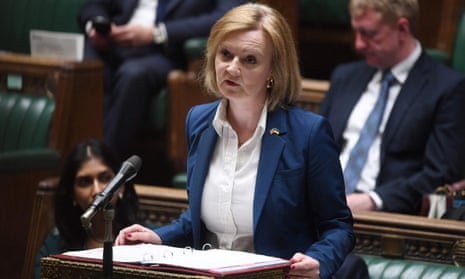At the recent Stormont elections, a majority of voters supported parties that broadly back the Northern Ireland protocol. Local business leaders have urged Boris Johnson to abandon the threat to unilaterally tear parts of it up, which would risk a trade war with the European Union when inflation rates are soaring and recession is looming. Sadly, what is truly best for Northern Ireland has rarely been allowed to disrupt this government’s choreographed games of Brexit brinkmanship with Brussels.
Tuesday’s Commons statement on the protocol by the foreign secretary, Liz Truss, was more measured in tone than some of the confrontational briefings around last week. But the tabling of a bill to abandon aspects of a treaty signed less than three years ago – when it was described as “oven-ready” – is irresponsible and recklessly destabilising. Ms Truss airily stated that the proposed legislation would not be in breach of international law, but failed to offer any evidence for that assertion. The EU was swift to warn that whatever legal casuistry may be forthcoming, it could respond to such a move with “all measures at its disposal”, which could mean shelving the entire post-Brexit free trade deal.
The government’s disingenuous case is that relations between the British mainland and Northern Ireland have been excessively undermined by the checks, tariffs and regulations insisted upon by the EU. It cites the refusal of the Democratic Unionist party to take up a power-sharing role alongside Sinn Féin as evidence that the Good Friday agreement is being imperilled by unionist discontent. This situation is, of course, directly the result of commitments made by Mr Johnson in 2019, when his priority was to force a hard Brexit. To avoid a north-south hard border on the island of Ireland, Mr Johnson agreed to an effective one in the Irish Sea – betraying a previous promise to the DUP in the process. The Brexiters’ maximalist determination to exit the EU single market meant that there had to be border checks somewhere.
That was then, for a government that burns relationships and trust at its own convenience. By now declaring a readiness to abrogate an international agreement, Ms Truss has sent a damaging message to the world that Britain’s word cannot be trusted. She has also needlessly antagonised our main trading partners, risking a downward spiral in relations with the EU at a time of economic crisis. There is an acceptance in Brussels that more flexible implementation of the protocol would be desirable, and a willingness to negotiate. Easements have already been offered, for example in relation to food-related checks and medicines. So why the escalation?
The posturing, the grandstanding and the slide to confrontation suggest that familiar Johnsonian dynamics are at play. The DUP remains sceptical that the “nuclear option” of legislation will ever come to pass. But the reopening of the forever Brexit wars constitutes some useful red meat to toss towards backbenchers, as Mr Johnson seeks to ride out Partygate. Ms Truss, who would seek to succeed the prime minister if he falls, may also consider it a good day’s work. Downing Street sources have suggested that Mr Johnson does not, in fact, relish the prospect of a trade war on top of a cost of living crisis. Hopefully – despite this latest episode of Brussels-bashing for the gallery – that assessment will prove to be correct.
Do you have an opinion on the issues raised in this article? If you would like to submit a letter of up to 300 words to be considered for publication, email it to us at guardian.letters@theguardian.com
